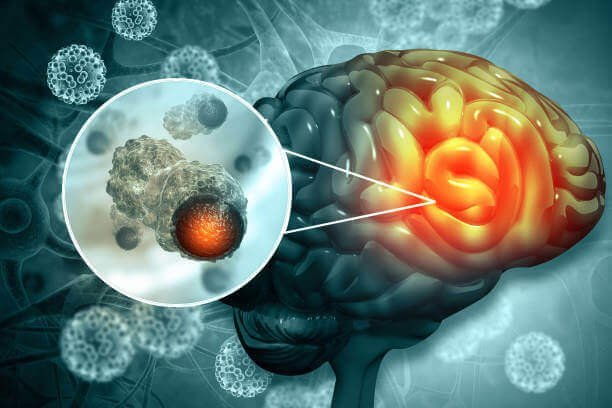
Brain tumours present a significant health challenge, affecting thousands of people each year. These complex growths can develop from various types of brain cells, leading to a spectrum of symptoms that can significantly impact daily life.
The brain’s role in controlling every function of the body makes it critical to recognise the warning signs early. Dr. Vikas Gupta, a leading Neurosurgeon, emphasises, “Understanding the symptoms of brain tumours is crucial. Early detection can dramatically improve treatment outcomes.”
In this blog, we will explore common brain tumour symptoms and share the experiences of patients who have bravely faced these challenges.
What Are the Key Symptoms of Brain Tumours?
Brain tumours can exhibit a variety of symptoms, which often depend on their size, type, and location within the brain. Some common symptoms include:
Persistent Headaches
One of the most frequent symptoms, persistent headaches, may worsen over time or feel different from any previous headaches. They can also be accompanied by nausea or vomiting, particularly in the morning. Patients often describe these headaches as the worst they’ve ever experienced.
For instance, Lisa, a 29-year-old who faced a challenging battle with a brain tumour, shared, “At first, I thought my headaches were just stress-related. But when they intensified and came with nausea, I knew something was wrong.”
Seizures
Brain tumours can irritate surrounding brain tissue, leading to new seizure activity. Seizures may manifest as convulsions but can also appear as brief lapses in consciousness or unusual sensations.
Dr. Gupta explains, “New-onset seizures, especially in adults without a prior history, should always raise suspicion for a potential brain tumour.”
Cognitive Changes
Tumours can interfere with mental function, causing memory issues, confusion, and difficulty concentrating. As Dr. Gupta notes, “Patients often overlook these changes, but this can signal a significant underlying problem.”
Changes in cognitive function can be subtle at first, making them easy to dismiss. However, they can become increasingly pronounced, affecting daily tasks and overall quality of life.
Visual Disturbances
Blurred or double vision, loss of peripheral vision, or other visual changes may indicate pressure on the optic nerve from a tumour. This symptom is particularly alarming and can indicate a more severe condition, necessitating immediate medical attention.
Motor Skill Impairments
If a tumour affects areas of the brain responsible for motor control, weakness, numbness, or coordination problems can occur. Patients might notice a decline in their ability to perform tasks that require fine motor skills.
“I started dropping things and tripping over my own feet,” recalls Ravi, a 35-year-old patient. “At first, I thought I was just clumsy, but it turned out to be a serious sign that something was wrong.”
Personality or Behavioral Changes
A noticeable shift in personality, mood swings, or increased irritability can suggest that a tumour is affecting emotional regulation. Family members may notice these changes first, leading them to encourage the affected individual to seek medical advice.
Hormonal Changes
Tumours in or near the pituitary gland can cause hormonal imbalances, leading to weight gain, fatigue, and changes in women’s menstrual cycles. Dr. Gupta explains, “Pituitary gland tumours often cause endocrine issues that can manifest in various ways, including changes in energy levels and mood.”
What Diagnostic Tests Are Essential for Identifying Brain Tumours?
A thorough evaluation is vital for diagnosing brain tumours. Doctors typically employ a combination of imaging tests, including:
- Magnetic Resonance Imaging (MRI): This is the primary tool for visualising brain tumours. It provides detailed images that help determine the tumour’s size and location.
- Computed Tomography (CT) Scan: This test can quickly reveal the presence of tumours and assess any swelling or bleeding in the brain.
- Neurological Examination: Doctors may assess reflexes, coordination, and cognitive function to better understand the tumour’s impact.
Dr. Gupta highlights, “Accurate imaging and a comprehensive neurological exam are the cornerstones of effective diagnosis. Without them, we cannot formulate an appropriate treatment plan.”
What Are the Treatment Options for Brain Tumours?
Treatment for brain tumours often requires a multifaceted approach. Depending on the type, location, and size of the tumour, options may include:
- Surgery: Surgery is often the first line of treatment, especially for accessible tumours.
- Radiation Therapy: Used post-surgery or for tumours that cannot be surgically removed. This therapy targets remaining tumour cells and can help shrink the tumour.
- Chemotherapy: Certain types of brain tumours respond to chemotherapy, which can help to slow growth or shrink tumours.
- Targeted Therapy: This emerging treatment focuses on specific genetic mutations within tumour cells, offering more tailored approaches to treatment.
What Is the Cost of Brain Tumour Surgery in India?
The cost of brain tumour surgery in India can vary widely based on factors such as the hospital’s location, the complexity of the procedure, and the patient’s overall health. Generally, prices range from ₹2,00,000 to ₹5,00,000 or more, which is approximately 2,400 to 6,000 USD, depending on these factors.
What Lifestyle Changes Can Aid Recovery?
Post-treatment, many patients find that adopting a healthier lifestyle can significantly improve their recovery process. Some beneficial changes may include:
- Nutritious Diet: A diet rich in fruits, vegetables, whole grains, and lean proteins can support overall health and recovery.
- Regular Exercise: Engaging in physical activity tailored to one’s abilities can improve strength, mobility, and emotional well-being.
- Stress Management Techniques: Practices such as mindfulness, yoga, and therapy can help reduce anxiety and improve mental health.
Conclusion
Recognising the symptoms of brain tumours is crucial for early intervention and effective treatment. Although the journey through diagnosis and treatment can be challenging, advancements in medical science continue to provide hope for many. Dr. Gupta’s insightful words resonate with those affected: “Staying informed and seeking help early can lead to better outcomes.”
If you or someone you love is experiencing symptoms, don’t hesitate to reach out to a healthcare professional. Together, we can confront the challenges posed by brain tumours and work towards a healthier future.
FAQs
Can brain tumours be hereditary?
Yes, some brain tumours can have a genetic component and may run in families.
How quickly do brain tumours grow?
The growth rate of brain tumours varies significantly; some can proliferate, while others may remain stable for years.
Are there any preventative measures for brain tumours?
While there are no guaranteed preventative measures, maintaining a healthy lifestyle may reduce some risk factors.
What age group is most affected by brain tumours?
Brain tumours can occur at any age, but certain types are more common in children, while others are more prevalent in adults.
Is follow-up care important after brain tumour treatment?
Yes, regular follow-up care is essential to monitor for any recurrence and manage potential long-term effects of treatment.
Explore more blogs: Is Brain Tumor Surgery Safe? Understanding the Risks and Benefits
